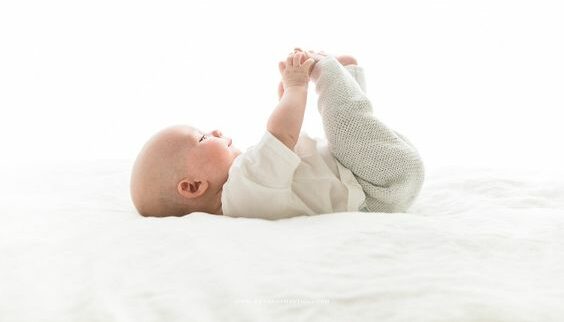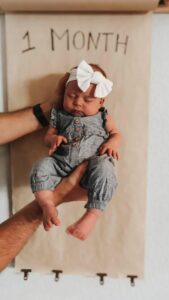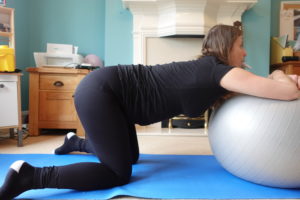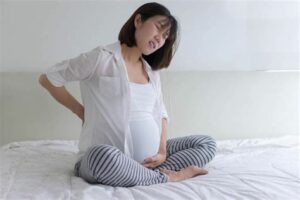Pregnancy, birth and the first months of life are a time of significant change and sometimes stress for babies, which can cause various problems (flat head, digestive problems, etc.), and sometimes even pathological issues (Congenital Torticollis, Clubfoot, etc.). My French Physio offers specific osteopathic and physiotherapeutic check-ups for newborns and infants under the age of one. These check-ups help to detect, treat, and even to prevent potential occurring problems.
To have a comprehensive understanding of babies, we need to look at the following systems:
The orthopedic system is made up of a set of tissues (bones, muscles, joints, etc.) that allow us to move. This system can be damaged at birth, or in rare occasions, babies can suffer trauma during their first few months of life.

Complication at Birth:
Complications can occur – for example – during the final stage of the pregnancy, when the fetus is in a confined space in the mother’s womb. Its neck or feet can get stuck in a non-physiological position. This malposition stretches the muscles on one side and shortens them on the other, which could lead to the following issues:
- Congenital Torticollis – The baby’s neck is stuck in one direction and his/her movements are restricted, which then could lead to Plagiocephaly (flat head).
- Clubfoot – The root cause of this issue is the same as in the case of Congenital Torticollis, but here the foot is affected. Clubfoot is the deformity of the ankle or the forefoot, which often has an impact on the baby’s walking development.
These problems can be treated with physiotherapy or osteopathy sessions. However, they often go unnoticed during the babies’ first few months. Many times, they are only discovered later, when infants are having trouble moving or walking. That is why an early check-up, which can help detect these problems, is extremely useful. The earlier these issues are revealed and treated, the less impact they will have on the babies’ development.
Problems during Babies first months
Unfortunately, newborns and infants can also suffer trauma which could damage their orthopedic system. For example, a complicated birth can put a strain on the baby’s muscles and joints (e.g., too much traction of one arm during birth can injure the brachial plexus). Falling from somewhere or undergoing surgery could also have a negative impact on the baby. In all these cases, an orthopedic system check-up helps to identify the exact impact of the trauma on the baby’s body. Personalized treatment can then be implemented to ensure that the child’s development continues as normally as possible.
The digestive system of newborns and infants up to the age of six months is often immature. On top of this, milk is not the easiest food in the world to digest… These two facts combined could lead to digestive issues, which in turn could cause various problems:

Reflux
Frequent regurgitations should be distinguished from reflux. Regurgitation corresponds to a small amount of vomiting. Reflux, on the other hand, is much more serious and causes other symptoms such as the regurgitation of 1/3rd of the consumed milk. Other symptoms, caused by reflux, are not always easy to identify or to link together:
- Frequent nocturnal awakening
- Weight-loss
- Excessive crying or irritability after feeding
- General discomfort or pain when lying down
- Persistent cough
The osteopathic check-up for newborns and infants under six months of age helps to identify these different symptoms and even to diagnose reflux. The osteopath or physiotherapist can then confirm the diagnosis by examining the baby’s abdomen. The abdomen of a baby with reflux will show signs of tension or adhesion. Visceral osteopathic treatment of these tensions and adhesions will help to ease the baby’s symptoms.
Silent Reflux
The presentation of symptoms is the same as for a baby with reflux. However, the newborn will not have as significant vomiting as described in the case of “normal” reflux, resulting in a more complicated diagnosis. A newborn suffering from silent reflux will have a lot of problems sleeping, eating and will often cry uncontrollably for no obvious reason, which can be very upsetting for the parents. A check-up is often a relief. It helps us to understand what is happening to your baby after which we can offer solutions.
Constipation
The defecation rhythm of newborns varies enormously from one baby to another. Some babies have several bowel movements a day. Others may have one every 2 or 3 days. However, even with regular bowel movements, your baby may have a swollen tummy, a lot of gas and difficulty pooping. Constipated babies often feel uncomfortable a few hours after eating and may wake up unexpectedly and go straight back to sleep after relieving gas.
Tensions and accumulations linked to the baby’s constipation can be easily identified by osteopathic auscultation. Visceral Osteopathic techniques can then be applied to eliminate them. Results are immediate with newborn babies. They will pass a lot of gas during and after the session. It is also common for babies to fall asleep during the session, as the relief of these tensions can be extremely tiring for newborns.

During Birth
During birth, the baby’s skull undergoes a considerable amount of pressure when it passes through the mother’s pelvis. A newborn’s skull is often flattened and conical. However, it is extremely soft and malleable and will gradually regain its normal shape. In some cases, these pressures and changes could lead to feeding and sleeping problems or even unexplained crying. The newborn’s check-up provides an opportunity to assess the state of tension in the baby’s skull and to relieve it if necessary.
Plagiocephaly & Flat Head
Since a baby’s head is extremely soft during the first few months, it can flatten easily. This flattening of the skull can be on one side or at the back. This is known as Plagiocephaly.
The main cause of this issue is Congenital Torticollis which means restrained neck movement. As a result, the baby only turns his head to one side. Spending most of its time lying down, the newborn ends up pressing on the same side of the skull all the time. This constant pressure flattens the baby’s skull on that particular side.
The newborn’s check-up provides an opportunity to assess the baby’s skull and determine whether Plagiocephaly and Torticollis are both present. If this is the case, the Congenital Torticollis should be treated first so that the baby’s neck regains its full range of movement. Cranial Osteopathic treatment will then help the baby’s head to return to its correct shape.
Psychomotor Development
A baby’s psychomotor development describes the evolution of his/her motor skills over time. Your baby’s psychomotor assessment will help you to determine the stage of development he/she is at. Amongst others, we will be particularly focusing at:
- The newborn’s primitive reflexes and their gradual disappearance (for more details, check out our article on primitive reflexes)
- The ability to move: rolling over, learning how to move on all fours, stand up and start walking, etc. (for more details, read our article on the development of babies from two months to one year old)
- Posture: ability to hold their head, to lift their head when lying on their stomach, to sit up, etc. (for more details, check out our article on the development of babies from two months to one year old)
The psychomotor assessment also enables us to identify whether there are any potential obstacles preventing the healthy development of your baby’s motor skills. These obstacles could take many forms. Muscular tension or joint restrictions can limit the baby’s movements and therefore his/her ability to discover new motor skills. Similarly, pathological conditions such as Congenital Torticollis or neurological conditions could prevent your baby from controlling his/her body and therefore from developing his/her motor skills normally.
In all these cases, the newborn’s check-up provides an opportunity to assess these factors and identify whether there are any obstacles to the baby’s development. If so, the osteopath or the physiotherapist will be able to show you techniques to help stimulate your child’s motor learning and they could suggest a personalized treatment plan, as well.
Naturally, a baby’s development doesn’t stop at one year old, so don’t hesitate to read our article on child development from one year to six years old.

Neuroligical Assessment
During pregnancy, birth and the first months of life, babies could suffer from a lack of oxygen or cerebral trauma that could lead to Cerebral Palsy. During the developmental check-up, various elements such as good tone, absence of spasticity, postural control, quality of movement, etc. are assessed to detect any potential damage to a child’s nervous system.
For more information, check out our article on neurological rehabilitation for children.
Respiratory Assesment
The respiratory check-up is not just a simple auscultation of the airways in search of mucus or inflammation. It is also an opportunity for the physiotherapist or osteopath to assess the mobility of the ribs and the respiratory system as a whole. Being born by vaginal delivery (compression of the ribs during delivery) or by caesarean section (the liquid contained in the baby’s lungs inside the mother’s womb is not expelled) could cause various difficulties in the baby’s first few months.
The newborn’s check-up helps to identify and to treat these problems. Treatment of such problems could take several forms:
- Manual therapy
- Osteopathy, including cranial and visceral osteopathy to work on the diaphragm
- Respiratory physiotherapy
The respiratory check-up is also an opportunity for the osteopath or physiotherapist to show you how to clean your baby’s nose. Children are unable to blow their noses until they are three or four years old. So, it is important to clean their noses with saline solution. This prevents mucus build-up and subsequent respiratory problems such as infant bronchiolitis.



